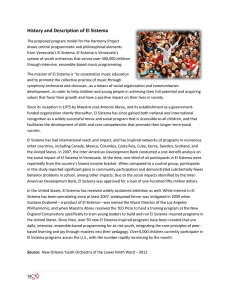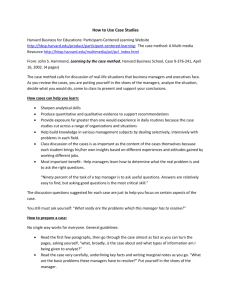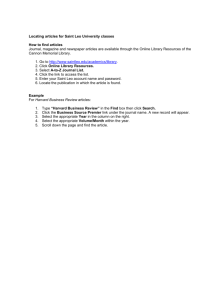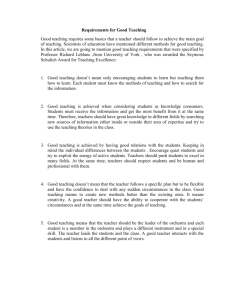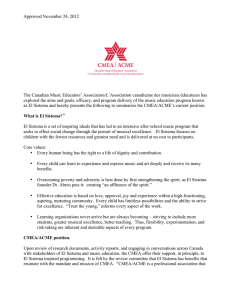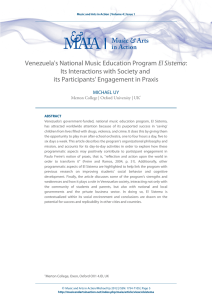Enrique Márquez Reflection Essay Music Education
advertisement
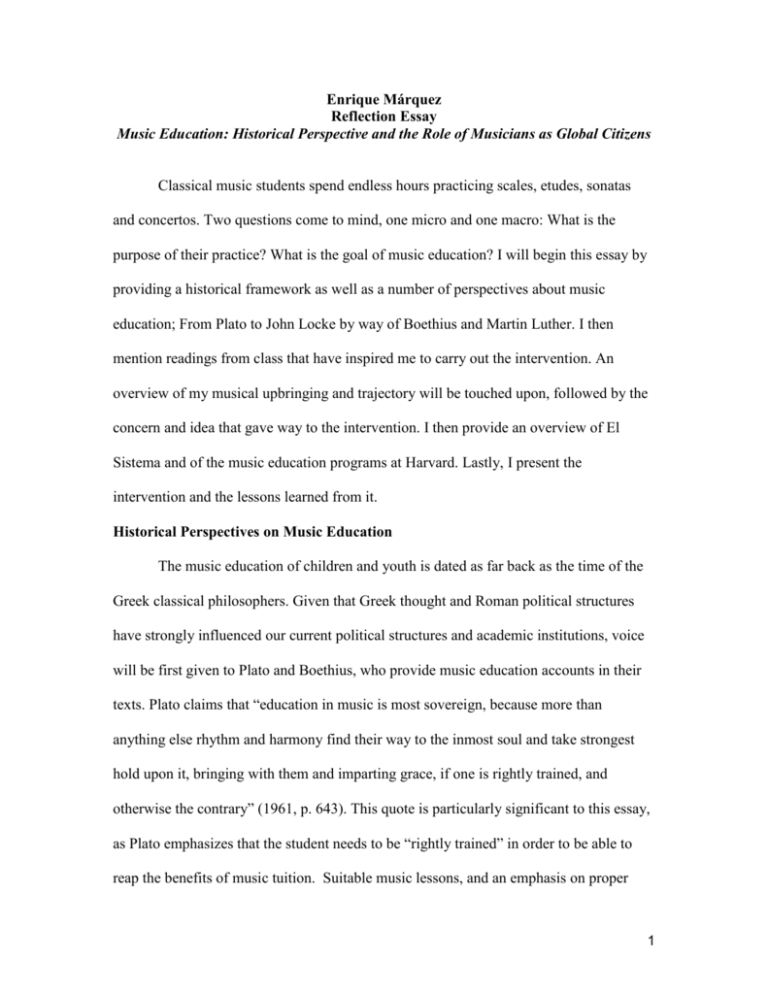
Enrique Márquez Reflection Essay Music Education: Historical Perspective and the Role of Musicians as Global Citizens Classical music students spend endless hours practicing scales, etudes, sonatas and concertos. Two questions come to mind, one micro and one macro: What is the purpose of their practice? What is the goal of music education? I will begin this essay by providing a historical framework as well as a number of perspectives about music education; From Plato to John Locke by way of Boethius and Martin Luther. I then mention readings from class that have inspired me to carry out the intervention. An overview of my musical upbringing and trajectory will be touched upon, followed by the concern and idea that gave way to the intervention. I then provide an overview of El Sistema and of the music education programs at Harvard. Lastly, I present the intervention and the lessons learned from it. Historical Perspectives on Music Education The music education of children and youth is dated as far back as the time of the Greek classical philosophers. Given that Greek thought and Roman political structures have strongly influenced our current political structures and academic institutions, voice will be first given to Plato and Boethius, who provide music education accounts in their texts. Plato claims that “education in music is most sovereign, because more than anything else rhythm and harmony find their way to the inmost soul and take strongest hold upon it, bringing with them and imparting grace, if one is rightly trained, and otherwise the contrary” (1961, p. 643). This quote is particularly significant to this essay, as Plato emphasizes that the student needs to be “rightly trained” in order to be able to reap the benefits of music tuition. Suitable music lessons, and an emphasis on proper 1 technique from the very beginning of a child’s training is key to their experience of joyous music making. Plato ads another layer of use for music education, saying that music “masters by analogous methods instill self-control and deter the young from evildoing”, (1961, p. 322) or in actual terms: crime prevention. Sixth century Christian philosopher Boethius agrees with Plato in regard to the instrumental aspect of music in molding young minds. Boethius mentions, “there is no greater path whereby instruction comes to the mind than through the ear. Therefore when rhythms and modes enter the mind by this path, there can be no doubt that they affect and remold the mind into their own character” (Bower, p.31), thus one must be careful as to which music is being taught to children and youth, as it will be an integral part of their inner development. Martin Luther goes a step further and demands for music education to be part of the school curriculum, and not only that, but he also argues that “a schoolmaster must be able to sing, otherwise, I will hear nothing of him” (1889, p.165). Luther concurs with Plato and Boethius, by claiming that “the young are to be continually exercised in this art; it makes good and skilful people of them” (ibid). In order to provide a counterargument to the above-mentioned comments—as well as to put forth the argument that music may have no tangible or practical value to society—we shall listen to the words of sixteenth century French protestant reformer, theologian and educator John Calvin; “Although the invention of the lyre and of other musical instruments serves our enjoyment and our pleasure rather than our needs, it ought not on that account be judged of no value; still less condemned” (Haroutunian, p.354). Calvin is still diplomatic in his views about the value of music, but his analysis is not shared with that of John Locke, who does not have a high regard for music. Locke takes 2 the gloves off and states that “Musick is thought to have some Affinity with Dancing, and a good Hand upon some Instruments is by many People mightily valued. But it wastes so much of a young Man’s Time to gain a moderate Skill in it; and engages often in such odd Company, that many think it much better spared. Amongst all those things that ever come into the lists of accomplishments, I give it next to poetry the last place. (Locke, p.174) Readings from Class I was particularly taken by “Pedagogy of the Oppressed” by Paulo Freire. He mentions that only the oppressed can liberate the oppressor (1970, p.26), which is what is happening with El Sistema: the oppressed in Venezuela are showing the world that change is possible, that classical music is for everyone, not just for the elites. They are bringing classical music back to the people, where it belongs. I was also inspired by John Dewey’s explanation of the placement of classical music in conservatories and in the concert hall, as opposed to in the community center and in the plazas, in the squares. Even though Dewey’s example is particular to visual art, it directly relates to classical music: ”the growth of capitalism has been a powerful influence in the development of the museum as the proper home for works of art, and in the promotion of the idea that they are apart from the common life” (1934, p.7). The philosophy of El Sistema is neither unique nor new; it has its theoretical foundation in the German concept of Bildung, the wonderful approach to education from a holistic perspective. Martin Swales succinctly portrays the term: “the word Bildung implies the generality of a culture, the clustering of values by which a man lives, rather than a specifically educational attainment... Bildung becomes, then, a total growth 3 process, a diffused Werden, or becoming, involving something more intangible than the acquirement of a finite number of lessons” (Swales, p.14). Overture I was born into a musical family. Three out of my four grandparents were pianists. My father was a piano professor at the Universidad Veracruzana, and my mother is a trained violist, who diverged toward arts administration at an early age and has since, become one of the most respected education managers in my hometown of Xalapa, Veracruz. I chose to play the viola when I was four years old, and started taking lessons soon after. As time went on I became disillusioned by having to practice every day, in order to prepare for a weekly lesson. There was a lack of enjoyment in that learning process, I had to learn etudes, sonatas and concertos and play them for my teacher and eventually in front of an audience. When I was eight years old I decided that I did not want to play anymore. My parents were upset, but respected my decision nevertheless. The first time I had the opportunity to play in a youth orchestra was during the summer of 1992 in the Sequoia forest, just after I had completed the sixth grade. That faithful summer of 1992 turned my life around. There was something so special about making music with others in a group setting. I was so captivated by being able to be part of a full orchestra and play the most glorious music I had ever heard: symphonic music. It is rather remarkable how the experience to play in a youth orchestra at age eleven shaped the rest of my life, and how that encounter ultimately brought me to the Harvard Graduate School of Education. Portrait of a Musician as a Young Man 4 When I was fifteen years old, my dream was to become a soloist, to perform concertos and chamber music recitals around the world with famous musicians. I watched videos and listened to recordings constantly while growing up. I attended the Interlochen Arts Academy, a boarding school in northern Michigan. While a student there, I would play chamber music with my friends any chance we had. We often got into trouble for playing late into the evening in the basement practice rooms in the dorm. The idea of becoming a soloist begins to feel further removed during college, when one begins to face the realities of the classical music industry. Even though I attended Indiana University Bloomington, a premier music school with famed alums such as Joshua Bell, Edgar Meyer and William Preucil. The students’ level of musicianship is high, with some students winning international competitions and positions in top orchestras. Yet only the very best achieve such accolades. What I am trying to say is that for example, the top music conservatories in New York City, Juilliard, Manhattan School of Music and the Mannes College of music turn out 500 graduates every year, and there are not nearly 500 job openings in orchestras or ensembles in New York City, or even in the entire country. There is a tremendous supply and demand imbalance among music school graduates and the field. While I attended a university, and had the chance to take a range of academic courses, I was so focused on the idea that I wanted to be a musician and only a musician, that I took only the required non-music courses. Looking back, I wish I had taken other courses or even worked towards a minor in another field. The Concern 5 As the professional job market cannot support the supply of conservatory-trained musicians, I envision two alternatives: the market needs to expand, or musicians need to be prepared to interact in the different spheres of the field: performing, teaching and administering. There is also a need to redefine success in the field, as the status is usually one that those who manage to win a job in a professional orchestra are the successful students, yet there are ranks within the position one holds: principal or section player. Then it matters which orchestra one plays in, it is not the same to play in the New York Philharmonic, the Atlanta Symphony or the Little Rock Symphony. The second “circle of hell” is that of teachers; as the saying goes, “those who cannot play, teach”. Many music school grads manage to teach and freelance. The lower of all tiers is that of those who manage people. They did not even make it as teachers. This discourse makes me uneasy, yet this preoccupation of mine is anything but new. Schiller showed a similar concern, “with us it might almost seem as though the various faculties appear as separate in practice as they are distinguished by the psychologist in theory, and we see not merely individuals, but whole classes of men, developing but one of their potentialities, while of the rest, as is stunted in plants, only vestigial traces remain” (Schiller, p.33). Schiller would be terrorized by the way that individuals are specialized beyond measure at present, and the general population ever more complacent and ignorant, yet masterfully up to date with the latest celebrity gossip and media frenzies. The Idea 6 The idea for this intervention began to come together, unknowingly, during the summer of 2002. I was then a member of the Youth Orchestra of the Americas (YOA); an ensemble comprised of musicians ages 16-26 from the Patagonia to Canada, selected through a competitive audition process. In hindsight, that summer was an augury of the present: it was the first time I had ever been to Boston; I met Gustavo Dudamel, with whom we rehearsed, performed, ate and partied for seven weeks. It was the first time that I came to Harvard University. In fact, the David Rockefeller Center for Latin American Studies (DRCLAS) hosted the YOA and provided a workshop for the musicians. That summer was also my first time in Venezuela, where I was introduced to El Sistema, a social program that provides tuition-free music education to 350,000 children and youth. We had the honor to meet the founder of El Sistema, José Antonio Abreu. Fast-forward 8 years: I am a graduate student at Harvard, interning at the DRCLAS. My experiences with the YOA allowed me to have the idea—albeit eight years later—to bring together a top-notch panel of music conservatory leaders to discuss how El Sistema’s social mission has influence their leadership, and how they envision the role of music conservatories looking forward. The discussion is appropriate and relevant for a number of reasons: the classical music industry is rapidly shifting; the barriers for making and distributing sound recordings are readily available to anyone with a microphone, a computer and an internet connection. Symphony orchestras in the United States are in a fragile financial state due to the global financial crisis, thus cutting down concerts and pay for their members. There are a number of musicians reticent to enter the industry’s twenty-first century paradigm; in which performing is only part of what being a musician entails. The 7 musician at present should be the embodiment of the total citizen: an educator, an entrepreneur, and an agent of positive change in the current dynamic cultural landscape. Clearly, not everyone has the willingness, talent or inclination to be so well rounded, and perhaps they should not be so well rounded, but music schools should provide those outlets for their students in order to prepare them for an integral and fulfilling professional life. This being said, students face a grim scenario, which at the same time is ripe for change and innovation. As it is said, necessity is the mother of all invention, or innovation in this context. El Sistema El Sistema is a social program founded in 1975 by José Antonio Abreu, who was then a professor of economics in Caracas. Abreu as a person is the embodiment of the German term Bildung. Abreu holds a PhD In petroleum economics and graduate degrees in music. He has held political office as well as academic positions in Venezuela. He is a pianist and a conductor, as well as an administrator. Abreu exemplifies what Schiller calls the “political and education artist”. His tremendous vision, will and determination have inspired many across the world to further music education, particularly for underserved children. According to El Sistema’s website, their “model” has been implemented in thirty countries in the Americas, Europe, Asia and Australia. There are many questions in regard to El Sistema and how to implement its model abroad. Yet there seems to be no system to El Sistema. There is no doubt that the Simón Bolívar Orchestra—El Sistema’s flagship ensemble—is a high-caliber ensemble that performs with utmost precision, energy and flare. I have had the honor to play with them, and can attest to the sophisticated music making that goes on. That being said, the Simón 8 Bolívar Orchestra is formed by the very best students or graduates from the entire country, so it is not a true representation of the general level of the 350,000 students in the program. If one was to put together an orchestra of the best young musicians from some Latin American countries like Brazil, Mexico or Argentina, and as economists say, ceteris paribus, meaning that these ensembles had the opportunity to have intense rehearsal periods, the quality of those ensembles would certainly be similar to that of the Simón Bolívar Orchestra. I do not mean to downplay El Sistema, I have a deep admiration for it, but it is a highly romanticized subject at present, yet there remain questions as if the quality of provision for the 350,000 students is in some way assessed, if there are teacher certification mechanisms, or even curricular standards. It would indeed be a fascinating study to evaluate and document El Sistema. Music Education at Harvard Part of the objective of the intervention was to bring the current subject of social development through music education to Harvard. Even though there is a Music Department and five student-run orchestras on campus, there is no formal music performance tuition. The Music Department grants graduate degrees in composition, musicology, ethnomusicology and theory: non-performance degrees. There is a dualprogram with the New England Conservatory (NEC), that grants an AB (Bachelor of Arts) and a MM (Master of Music) in 5 years. Then again, the students enrolled in that program receive music lessons at NEC. This aspect was of concern at the DRCLAS; they were uncertain that the Harvard community would be interested in a panel discussion so narrowly focused on music conservatories. Thankfully, the event was very well attended, and the discussion was enriching, sharp and informative. 9 The Intervention In order to address the issue of young musicians attending competitive academic programs, which narrowly prepares them for an eroding professional field, I decided to organize a panel discussion in collaboration with the David Rockefeller Center for Latin American Studies at Harvard (DRCLAS) which was part of the “Venezuelan Legacy Series”, titled “Discerning New Visions for Music Conservatories: Lessons from El Sistema. Merilee Grindle, Director of DRCLAS, introduced the panel. Jack Megan, Director of the Office for the Arts at Harvard provided introductory remarks. The panel was moderated by Steve Seidel, Director of the Arts in Education program at the Harvard Graduate School of Education. The panelists were Robert Sirota, President of the Manhattan School of Music, Benjamín Juárez, Dean of the College of Fine Arts at Boston University and Tony Woodcock, President of the New England Conservatory. It was my intention to use these panel discussions as a platform to bring together the cultural and artistic actors at Harvard. The panel brought together the “ARTS@DRCLAS” initiative of the David Rockefeller Center for Latin American Studies, the Harvard Graduate School or Education, the Office for the Arts at Harvard and Cultural Agents Initiative. The discussion was fluid and engaging, as well as masterfully moderated by Steve Seidel. We were fortunate enough to have a Paul Desenne in the audience, a founding member of the Simon Bolivar Orchestra. Paul offered sobering comments, mentioning that “what you are seeing today in Venezuela is the product of a huge experiment that took many, many years to come to maturity”, Paul emphasized that the driving force of El Sistema was musical excellence and passion above anything. (Márquez, p.27). 10 Lessons learned After analyzing and reflecting back on the panel discussion, I gather that the three panelists are devoted to providing a more holistic education to their students. The Manhattan School or Music and the New England Conservatory have launched music entrepreneurship programs to offer their students necessary tools in the current professional landscape. On the other hand, Boston University’s College of Fine Arts, which encompasses three schools: music, theater and visual arts, has an advantage over the two conservatories, as the three colleges are housed in a research university, thus allowing their students to pursue further academic studies. The three panelists were talking not only about preparing outstanding musicians, but also leaders in the community. References Bower, C. M. (1967). “Boethius” The Principles of Music, and Introduction, Translation, and Commentary, (PhD. Dissertation), George Peabody College for Teachers, Vanderbilt 11 Dewey, J. (1934). Art as Experience. New York: Penguin. Freire, P. (1970). Pedagogy of the Oppressed, London: Penguin. Hamilton, E. & Cairns, H. (1961). Protagoras The Collected Dialogues of Plato. Princeton, Princeton University Press. Hamilton, E. & Cairns, H. (1961). Republic III The Collected Dialogues of Plato. Princeton, Princeton University Press. Haroutunian, J. & Smith, L. (1958). “Ethics and the Common Life,” in Calvin: Commentaries, in Vol. XXIII, The Library of Christian Classics. Philadelphia: The Westminster Press. Locke, J. (1913). Some Thoughts Concerning Education. Cambridge: Cambridge University Press. Márquez, E. (2010) Discerning New Visions for Music Conservatories: Lessons from El Sistema, Panel Discussion. Cambridge, Harvard University. Painter, F. V. N. (1889). Luther on Education. Philadelphia: Lutheran Publication Society. Von Schiller, J. C. Friedrich “Upon The Aesthetic Education of Man,” LETTERS (Vol.32). 12
